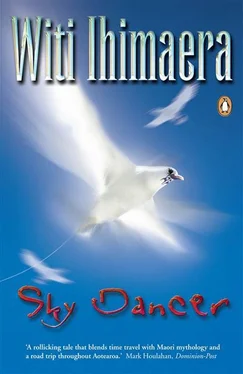High above, quartering the land with upswept wings, was Chieftain Kahu of the hawk iwi. Proud and magnificent, protector of the upper skies, he kept lookout on the landbird processions below. “Come on, people,” he called to the stragglers. “Make greater haste, kia tere, kia tere.” Sometimes he sent his beautiful daughter, Kahurangi, or one of his virile sons with a more peremptory command to move it or lose it.
Eventually, one by one, the landbird chieftains arrived at the twin mountains closest to the moon. Chieftain Kuku of the pigeon iwi was showing the effects of eating too well during his travels; the puku of his white breast bulged over his dark plumage. He saw the sacred tree in front of him and wondered how on earth he was going to get to the top.
For Chieftain Kakariki of the parakeets, however, ascending the branches was a breeze. “Torete! Kaurehe!” he cried as he leapt from one branch to the next, chattering and spreading juicy gossip.
Chieftain Kakapo stayed on the ground, making up for his lack of flight by being his usual aggressive and male chauvinist self. There, he struck poses of superiority and cast angry looks at the women chieftains present — Te Arikinui Huia, Te Arikinui Korimako and Te Arikinui Karuwai.
“The parliament is the place of men,” Kakapo muttered. “A hen’s place is behind her man.”
Always on the prowl, Chieftain Pukeko was making a nuisance of himself, trampling over Chieftain Kiwi, the shy hidden bird of Tane. Seeing this, Chieftain Kokako of the crows flew at him: “Hie! Hie! Haere ki te huhi, haere ki te repo! Go away! Leave him alone! Go back to the swamp where you came from!”
As for Chieftain Kea, he was lording it in his multi-coloured magnificence, strutting his stuff before his many wives.
Chieftain Pitoitoi of the robin whanau wasn’t impressed. “That Kea is all blow and no go,” he said.
Chieftain Kaka, Chieftain Koreke of the quails and Chieftain Parera of grey ducks all agreed. They noted that Kea had made a throne on his branch.
“Those Te Arawa customs are being taken up by everyone,” said Chieftain Piwakawaka of fantails.
Chieftain Stitchbird of the native thrush iwi tittered; and so did Chieftain Popokatea of the whitehead whanau and Chieftain Brightbird of the silver-eye iwi.
It was an impressive sight to see the chieftains of the manu whenua hopping and flying among the branches of the sacred tree and taking their places. It was to be expected that there should be squabbles as some of the birds pretended to forget their lower status and tried to ascend to somebody else’s branch; the upstarts were sent packing down to lower branches where they belonged. The roll call revealed that Chieftain Tui’s command to come had indeed been heeded by all landbird chieftains. There was shy Chieftain Pakura of the swamp-hens, Chieftain Matuku of the bitterns, Chieftain Koekoea of the long-tailed cuckoos, Chieftain Pipiwharauroa of the shining-cuckoos, and Chieftain Kuaka of godwits. Chieftain Ruru of moreporks and Chieftain Whekau of laughing-owls waited for complete darkness before taking their places.
Chieftain Pekapeka of bats also waited until night fell, hanging from his own special upside-down branch. His participation was by special agreement of the birds, who had never been sure of his avian status but were persuaded by the fact that he flew.
Last to arrive at the Runanga a Manu, because they had come furthest, were Chieftain Titi of the southern muttonbirds and the graceful Te Arikinui Kotuku of the white heron colony at Okarito. They brought apologies from Chieftain Moa, which was a relief to all because he took up so much room when he sat down.
Kotuku was always one to make an entrance, gliding in like a glistening dream, her long white feathers raking the moon. She took her branch beside the other women chieftains.
“We’re so glad you’re here,” Te Arikinui Korimako said. “Kakapo is being such a teke.”
Kotuku fluted a silvery voice. “Not to worry, dear,” she said. “Me and Huia can fix him any day. What do you say, Huia?”
The gorgeous Te Arikinui Huia sighed a delicious sigh. She preened her white-tipped plumes and adjusted her fabulous white-feathered choker. “My dears, he lives on the ground ,” she said throatily.
The assembly was complete. Within the amphitheatre of the twin mountains, sitting in the most ancient tree of the Great Forest of Tane, the extraordinary meeting waited to come to order. Whistling, trilling, cooing and warbling, the chieftains settled down.
Chieftain Kahu reported to Chieftain Tui. “All present and correct, sir.”
Tui coughed, preparing to speak. He flew to the perch of chiefs, folded his wings and hopped, strutted, tap-danced and two-stepped his way along the branch.
“Show-off,” whispered Te Arikinui Karuwai, who had been one of Tui’s many conquests.
A glow came up behind the twin mountains, illuminating the sacred tree with unearthly beauty. The moon arose, full, belling out into the night. A great sigh of wonder came from the throats of the landbirds as they watched it ascend. Higher and higher it rose, dimming the stars with its awesome radiance. Tui lifted his voice:
“Whakarongo ake au ki te tangi a te manu nei a te ma tui, tui, tuituia!”
The Runanga a Manu, the Parliament of Birds, was in session.
— 4 —
“E nga rangatira,” Tui began, “tena koutou, tena koutou, tena koutou katoa.” He adjusted his mazarine blue cloak. “As we all know it was the great Lord Tane who with other Lords pushed up the Sky Father. In the space between he created his Great Forest as the home for us, the birds, his children. As our guardian he appointed the Lord Punaweko.”
“Ka tika, ka tika,” Chieftain Kuku interjected. The assembly murmured in agreement.
“The Lord Tane also set aside the coast and the seas of our whanaunga, the seabirds, under the guardianship of the Lord Hurumanu. This setting apart of manu whenua and manu moana has been enshrined in Divine Law and, in our history, as the Great Division.”
“That is true, that is true,” Chieftain Kokako assented.
“Now,” Tui continued, “the alarm has been raised about the seabird troops that are gathering at the island fortress of Karuhiruhi, Lord of seashags. The troops have been training under the generalship of Karoro, chieftain of black-backed gulls. Special frontline squads under the command of Chieftain Toroa, Chieftain Taranui and Chieftain Parara have also been observed in specialist military activities.”
The landbird chieftains began to murmur, shifting uneasily and hopping along their branches.
“How are we to respond to this challenge?” Tui asked. “This is the question you must debate. This is why I have called you all to this extraordinary meeting of the Runanga.”
Tui flew back to his branch.
For a moment there was silence.
Then, rather prematurely, Kawau the rivershag flew from his low branch up to the perch of chiefs. There was an instant ruffling of feathers as the other birds expressed their displeasure at Kawau daring to fly past others of greater mana and take the perch before they did. Not even his showy display of strutting footwork and beakwork pacified them.
“E nga rangatira,” Kawau began. His tone was pompous as he endeavoured to ingratiate himself. “It was I who brought the word to Chieftain Tui, and it was on my intelligence that he decided to call the Runanga. I —”
“Typical, typical,” Te Arikinui Kotuku called out. “It is only the rivershag that cries out its own name. Ko au! Ko au! Ko au!”
The other chieftains laughed good-humouredly. But Kawau extended his neck in an arrogant gesture, dismissive of Kotuku. “It is easy for Kotuku to challenge me. After all, she has only one small inlet at Okarito to defend, an insignificant stretch of tepid water that nobody would want, whereas I have a lagoon famed for its food supplies.”
Читать дальше












